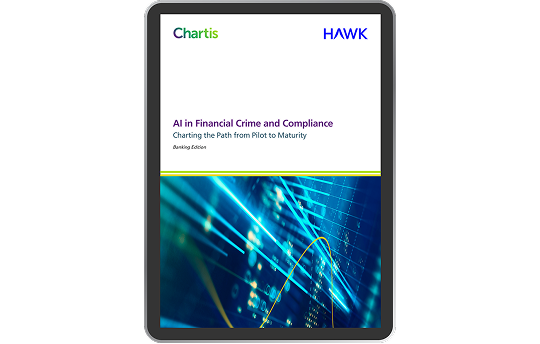AI in Financial Crime & Compliance: Charting the Path from Pilot to Maturity
A Global Banking Report by Chartis and Hawk

Global research from Hawk and Chartis reveals how banks are moving from pilot projects to large-scale AI adoption — unlocking measurable gains in detection accuracy, operational efficiency, and compliance cost reduction.
Banks are no longer asking if AI works — they’re focused on how to scale it. The latest research shows that 2025 marks a turning point for financial crime compliance (FCC) as banks advance from experimentation to execution.
According to the study, 82% of banks expect AI investment to increase by more than 25% in the next 2–3 years, driven by proven results in detection accuracy, efficiency, and cost savings.
This report uncovers how banks are applying Machine Learning, Generative AI, and Agentic AI to transform the speed, precision, and scalability of compliance programs worldwide.
Key Findings:
AI Delivers Tangible ROI-
Detection accuracy ranks as the #1 benefit of AI, cited by over half of banks surveyed.
-
Faster investigations and reduced operational costs follow closely behind.
-
71% of banks already report AML cost savings, and 94% expect even greater savings within 12 months.
-
More than half of the project savings are expected to exceed $5 million over the next few years.
Regulatory Confidence Strengthens
-
60% of banks expect regulators to become more supportive of AI.
-
Optimism is highest in the U.S. (66%) and LATAM (80%), signaling a global shift toward regulatory acceptance that will fuel broader adoption.
Banks are increasingly optimistic about Generative AI & Agentic AI
- 33% believe Agentic AI will transform how financial crime work is done.
- 45% expect it to enhance existing processes.
- Generative AI is already delivering value in data processing, case management, and analyst guidance.
- Agentic AI is emerging as a powerful tool for narrative writing, SAR drafting, and investigative automation.
Why it Matters:
AI is no longer experimental — it’s essential.
And the institutions that master scaling will lead the next generation of compliance innovation.
“Banks aren’t asking if AI works anymore. Instead, they’re focusing on how to scale it."
LEARN MORE
How are Fintech and Payments Firms Charting Their Path From Pilot to Maturity? Read more in our companion report here.
